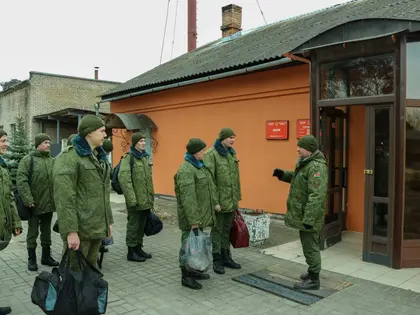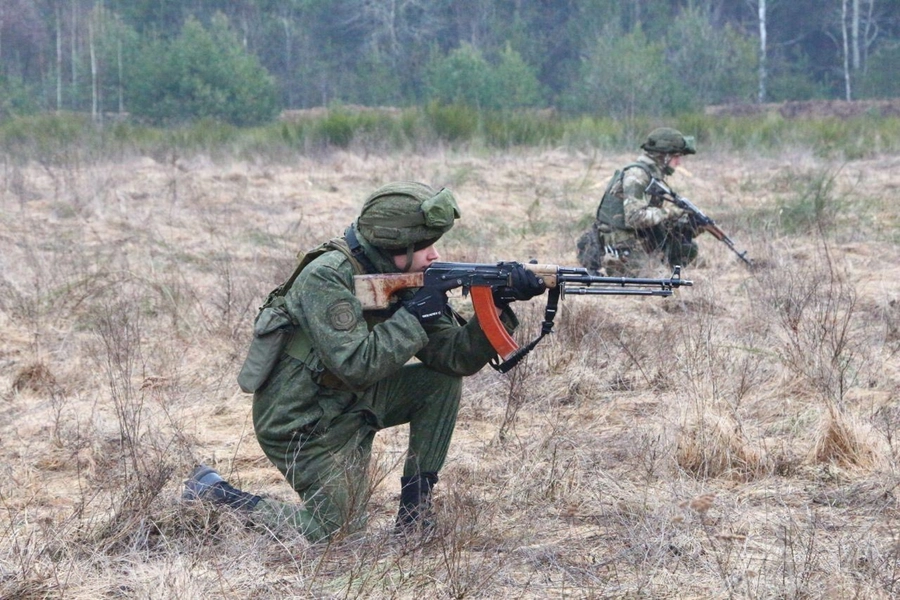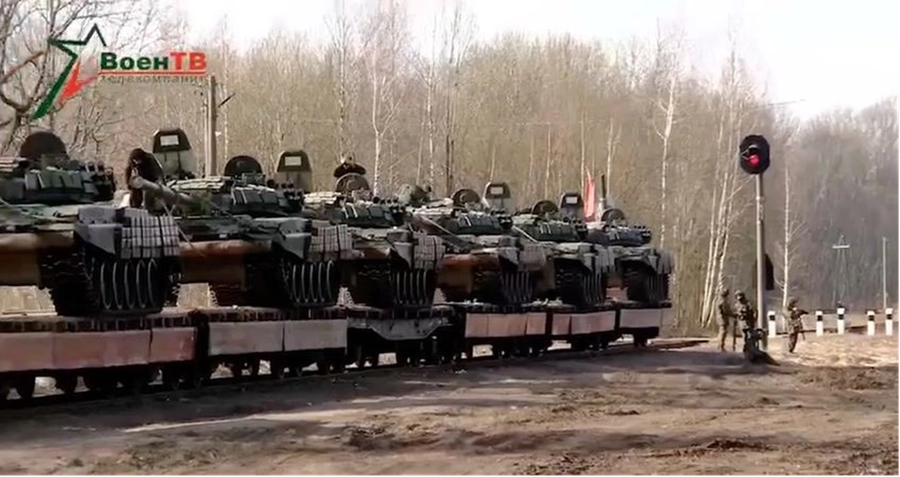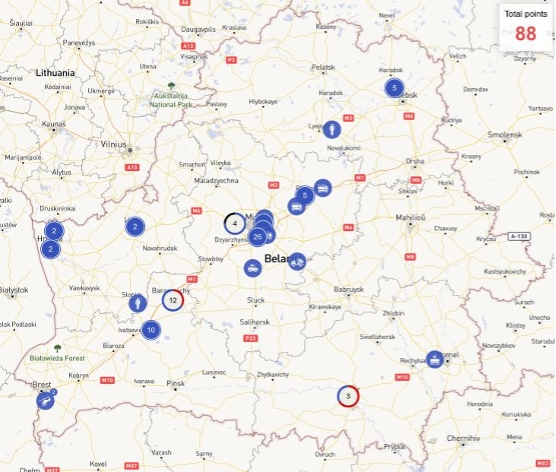The Kremlin ally Belarus has mobilized reservists and kicked off major military maneuvers with live-fire gunnery and rare field exercises with territorial defense units, some near NATO borders, official and opposition reports said.
JOIN US ON TELEGRAM
Follow our coverage of the war on the @Kyivpost_official.
Belarusian soldiers practice infantry tactics at a training area. Photograph published by the opposition Belarusian Hajun project on March 11.
A reinforced mechanized infantry battalion from 19th Mechanized Brigade was reportedly unloading on March 14 at a train station in Belarus’ far-western Ashmyany region, some 20 km from the Lithuanian border.
Belarus’ national railroad reported the force included nine T-72B tanks, 24 BMP-2 infantry fighting vehicles, and more than 30 other support vehicles.
Elements of a Belarusian tank unit arrive at a rail depot in central Belarus. March 11 screen grab published by the state-run Belarusian television channel VoentTV. According to reports published by the opposition Hajun group, the tanks and crews were part of 19th Mechanized Brigade,and participating in snap readiness manuevers on NATO’s north-eastern flank.
On Thursday Belarus’ Defense Ministry widened the scale of the exercises, announcing snap defense exercises for territorial defense units in the country’s western Grodno region, next to Poland.
Initial stages of the wide-reaching Belarusian readiness drills involving regular troops, reservists recalled to colors and territorial defense units kicked off on March 11. The main objective of the training was to practice wartime mobilization and defense of Belarusian territory against an aggressor, official statements said.

Belarusians and Ukrainians Must Unite
Combat formations involved included elements of the 6th, 11th, and 19th Mechanized Brigades, as well as signal and engineering units, the independent news platform Belarusian Hajun reported.
The authoritarian former Soviet republic’s relatively small army fields four combat brigades, of which elements of three were reportedly participating in the maneuvers.
The training was centered in the Minsk, Brest and Homiel regions, the report said. Combat readiness inspections were in progress on March 14 in the western Homiel region, home to Belarus’ Northwest Operational Command of Ground Forces. The formation is the Belarusian army’s command headquarters for troops deployed opposite Lithuania and Latvia.
A Belarusian army statement said of the readiness inspection: “Personnel will have to move to designated areas and conduct a series of exercises and training, including live fire. During the inspection, the movement of military equipment is planned, and it is possible to temporarily restrict the movement of civilian transport on public roads and areas.”
Territorial defense soldiers numbering more than 300 men also were participating in live-fire training and field exercises next to NATO’s extreme northeastern flank, the Hajun report said. Helicopters moving infantry were observed in air space above northwest Belarus near the village of Hozha, and combat jets above the town of Lida.
At their closest, the Belarusian combat aircraft were per local observer reports operating some 15 km from NATO airspace.
Other Belarusian military activity spotted in the last week by independent Belarusian media included parachute infantry jump training near Vitebsk, and An-124 Russian military heavy cargo jets operating from the major Maschulishy air base south of the capital of Minsk.
According to the Ukrainian National Resistance Center (NRC), some of the readiness exercises were focusing on Belarusian border territories with Ukraine.
Map published by Belarusian Hajun project on Mar. 11 showing recent army activity spotted by opposition observers, and where it took place.
Belarus’ authoritarian President Aleksandr Lukashenko in February approved a new National Security doctrine incorporating the presence of recently arrived Russian nuclear weapons on Belarusian territory, and assuming increased threat of NATO attack against Belarus.
“Belarus’s new military doctrine appears to emphasize tactical nuclear weapons as a means of preventing others from attacking the country,” a Jamestown Foundation analysis of the new Belarusian military doctrine said.
Russia in February 2022 launched tens of thousands of troops and hundreds of air strikes from Belarus into Ukraine, but Russian troop presence plummeted later in the year after Moscow redeployed forces to west Russia.
The Russian Air Force still flies limited air surveillance and fighter patrols from Belarusian military airfields, and small formations of Russian troops train at Belarusian bases before deploying to Ukraine. A contingent of Russian mercenaries not formally part of Kremlin forces, and numbering 500-1,000 men, is based in Belarus as trainers.
According to an NRC report Igor Kruchkov, a senior official in the Belarusian State Border Committee, criticized the Russian instructors for poor training skills. The continuing Russian military trainer presence in Belarus is part of a Kremlin strategy to force Minsk into military conflict with Kyiv, he said.
NATO spokespersons have repeatedly stated the Atlantic Alliance is defensive and NATO troops would only fight the Belarusian military were Belarus to attack first.
Aside from its own army for national defense, Lithuania hosts a multi-national battlegroup with troops on temporary deployment to the Baltic state from other NATO members.
Germany is the lead contributor. Belgium, the Netherlands, Norway, Czechia, Croatia and Luxembourg also have contingents currently in country.
In December Germany and Lithuania agreed Germany would permanently station a full German Brigade in Lithuania beginning in 2025.
You can also highlight the text and press Ctrl + Enter









